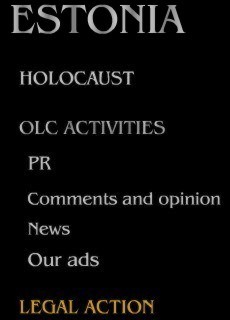| |
|
|
| |
The Failure to Prosecute Nazi War Criminals in Lithuania, Latvia, and
Estonia 1991-2002 |
|
| |
Although numerous
Baltic Nazi war criminals were brought to trial by the Soviet
authorities following the reoccupation of the Baltics in
1944, many Lithuanian, Latvian, and Estonian Holocaust perpetrators
remained unprosecuted when these countries regained their
independence in 1991. Some were still living in the Baltics,
while many others had escaped towards the end of World War
II to Germany or Sweden from whence most subsequently emigrated
overseas to the United States, Canada, Australia, and Great
Britain or other destinations. In some of these countries
of refuge – primarily in the United States – successful efforts were already underway to identify and take legal action against
these Holocaust perpetrators, a policy which ultimately led
to the return of some of these war criminals to their native
land. Thus when Lithuania, Latvia, and Estonia once again
became independent, there were quite a few cases of Baltic
Nazi war criminals which could and should have been dealt
with the local authorities. What has been achieved in this
regard during the past more than eleven years of Baltic independence? more...
_________________________________________________________________________ |
|
| |
|
|
| |
SHALOM
Estonia |
|
| |
It is very
rare, if not unprecedented, for an American ambassador
to write an op-ed piece in a local newspaper severely
criticizing the country he is serving in for failing
to take sufficient measures to prosecute local Nazi
war criminals, but that is precisely what Joseph
De Thomas, U.S. ambassador to Estonia, did in late
May this year. In a pointed op-ed piece which appeared
on May 28 in the Estonian daily Eesti Paevaleht,
Ambassador De Thomas took his host country to task
for its failure to adequately deal with three major
issues relating to the Holocaust and suggested the
following practical steps to help remedy the situation.
In his words, Estonia had to “Do justice where justice is needed,” i.e. take a proactive stance on the prosecution of Estonian Nazi war criminals,
not a single one of whom had been brought to trial
since Estonia obtained its independence from the
Soviet Union (as opposed to Communist criminals many
of whom have been brought to trial); “Recognize the Holocaust is part of Estonia’s history,” i.e. observe Yom Hashoa in a dignified and significant manner and mark all the
sites in the country in which the crimes of the Holocaust
were committed; and “Teach our children about the past,” i.e. make sure that the subject of the Holocaust is adequately covered in Estonian
textbooks, which as far as Ambassador De Thomas understood
is not currently the case. more...
_________________________________________________________________________ |
|


